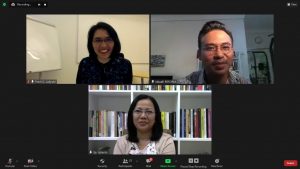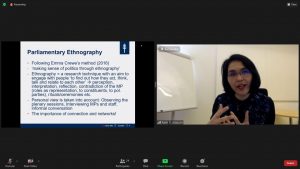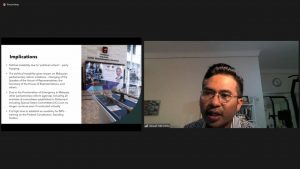
Aiming for the parliament of 21st-century
There is a need for the parliaments of Indonesia, Malaysia, and Singapore to be “working parliaments”, and to address the Sustainable Development Goals/SDG, starting from the Plenary Session, as the public face, said Dr. Ratih D. Adiputri, from the University of Jyväskylä, Finland in Southeast Asia Talk forum (25/05/2021). She presented her chapter entitled Social Science Research in Southeast Asia: The Challenges of studying Parliamentary Institutions in a book series discussion of the book “Social Science in the Age of Transformation and Disruption: Its Relevance, Role and Challenge” (2020), edited by Prof. Dr. phil. Hermin Indah Wahyuni and Dr. phil. Vissia Ita Yulianto from CESASS, the Centre of Southeast Asian Social Studies , Gadjah Mada University (UGM).

Dr. Ratih further explained that most Indonesian people think that compared to the Suharto era, the Indonesian parliament, DPR, has a much stronger constitutional and legal position. This is true in the paper, but not in reality. ”Despite the democratization, the Indonesian parliament still uses the outdated procedure. This means that the plenary session consists only of a ceremonial feature of hearing the long speeches, and not debating nor the members of parliament may have a chance to say something to show to constituents (apart from irrelevant interruption). The balkanized system of commission/committee with 10% members continues, and an MP from one committee may not join the discussion at other committees even when it is relevant to the issues of his/her constituents. It is a privilege of membership only. Furthermore, moreover, the Indonesian members of parliament revolve so much on the affiliation of political parties and their committee instead of their constituent relevance”.
Thus, it is common in the DPR to see the Minister of Health only comes to Commission IX, or the Minister of Education goes to Commission X only, even though the issues of the COVID-19 pandemic and the fate of children education due to the school closure impacted to all citizens. These ministerial meetings deserve to be seen in the Plenary Session, as the procedure says so. Only members of the relevant commission, which are only 10% from all DPR membership, may have the discussion or dialogue with the ministers – others, even when you are members of parliament and the constituents have important and relevant cases cannot join. Such “balkanized system” of commission/committee continues until today.

The plenary session also continues to show the ceremonial feature of hearing the long speeches. There is no debating existing, nor the members of parliament may have a chance to say something to show to constituents (apart from irrelevant interruption). The journalists then have tendency to report the “sleeping member of parliament” caught during the Plenary Session, while it is indeed a boring situation hearing all factions (grouping of political parties in the DPR) to deliver their speeches in the podium. It would be interesting and lively if each faction may show the points of the legislation issue (maximum 2 pages, delivered within max. 10 minutes?) and other members who attended the plenary would have short statement about the issue. This would be a public show for the constituents (when their representative members say anything); for citizens to learn how the legislation is enacted; for the members of parliament to speak eloquently for the constituents in public; and notably to show that parliament is a modern institution, addressing the democracy and the challenge of the SDG that the parliament has not shown yet.
The discussant of the webinar event, Idzuafi Hadi Kamilan –the Executive Director, Institute for Political Reform and Democracy (REFORM), Malaysia – also updated the information on the Malaysian parliament. In May 2018, the historic election of the fall of Barisan Nasional, which taking Dr. Mahathir Muhamad as the prime minister/PM, not from UMNO but from Pakatan Harapan. However, this historic moment changed after Dr. Mahathir quitted as PM in February 2020 and there was “Sheraton Move” where some members of parliament hopping to the opposition and this changed the dynamic again in the parliament. In early 2021, there was a withdrawal of support for Perikatan Nasional made by Ahmad Jazlan Yaakub, thus withdrawal support for the PN government.

Indeed, the different parliamentary procedures are clearly seen from the Indonesian parliament, of the presidential system, to the Westminster system of Malaysian and Singaporean parliament. In Malaysia and Singapore, each member of parliament addresses her/himself based on constituent affiliation, and a plenary is a place for debating (with registration and limited time of speaking). The plenary acts as the face of the parliament for the citizens and the constituent to see their representative contribute to the discussion, not merely an interruption.
It is of course a complex issue to adopt the Westminster style of parliament, however the constituent’s affiliation must be stated all the time by the members of parliament, like the USA’s parliament, for example. It is not enough stating only the members’ political party’s name or the commission/committee names!
To conclude the event, Dr. Adiputri and Mr. Kamilan emphasized the need that “every parliament needs to be a working parliament” and addresses the 21st century parliament that “representative, transparent, accessible, accountable, and effective” (IPU, 2005).
Please click: [SEA-TALK #42] Discussion #6 on “Social Science in the Age of Transformation and Disruption” – YouTube for detail.
To purchase the book please click:
Domestic order:
https://bit.ly/socialsciencebookCESASS or http://www.tokopedia.com/cesassugm
International order:
http://bit.ly/bookorderforinternational
CP: (+62) 857-8655-1075 (Nur’aini)
About the Speakers:
Dr. Ratih D. Adiputri is Indonesian researcher also a Postdoctoral researcher and university lecturer at the University of Jyvaskyla, Finland. Her research topics are Parliamentary Institutions, Southeast Asia, and Sustainable Development Goals (SDGs). In general her research and teaching interests are in parliamentary/legislative studies, political culture, political thought, and democratization process or political changes, especially on parliamentary procedure, democratic traditions and Indonesian-Southeast Asian politics.
Google Scholar : https://scholar.google.com/citations?user=TEr3BT8AAAAJ&hl=en
Idzuafi Hadi Kamilan is the Head of Legal and International Treaties, Human Rights Commission of Malaysia (SUHAKAM). Previously, He was a Parliamentary Research officer from 2012 and was seconded at the Office of the Speaker of the House of Representatives from 2015-2018. He has significant capability in area of research such as Constitutional Law, Parliamentary Practice and Procedure in Malaysia. He has significant capability in area of research such as Constitutional Law, Parliamentary Practise and Procedure in Malaysia. He attended several international parliamentary training including Fulbright Visiting Scholar at the University at Albany (2019-2020).
[embedyt] https://www.youtube.com/watch?v=pFfCk-QmXtY[/embedyt]
